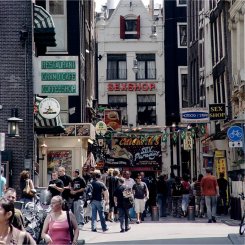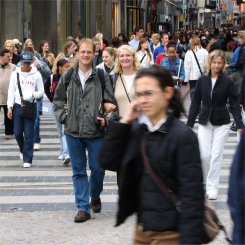Population of Amsterdam: Facts on the Amsterdam People
What is the population of Amsterdam like? Walking around Amsterdam, it is easy to imagine it as a city of international travellers, surrounded as you are by people of all different races, languages and creeds. But what about those that call Amsterdam home?
Amsterdam's population was recorded at the beginning of 2009 as 756,347 people. While this may not seem like much for a city as famous as Amsterdam, the city's size means that its small but perfectly formed population fits it just right.

Also to consider is the fact that, in a country as urbanized as the Netherlands, the surrounding areas provide a large amount of commuters who work in Amsterdam but are not recorded as residents of the city itself. The population of Amsterdam is still growing, with an estimated 20,000 more residents expected in the city by 2015 according to the Dutch government's projections.
Expats and Immigrants
The above figures for the population of Amsterdam do fail to take into account those living in the city who are not registered with the government as official residents. In a city called home by so many foreign nationals, this figure is likely to be quite higher.
This international focus also means that Amsterdam has a large English speaking population. While not all immigrants to the Netherlands speak English as their first language, the internationality of English means that it is the common language for many different nationalities in Amsterdam - more so than Dutch in many cases.
According to the Amsterdam city administration, no less than 177 nationalities live inside Amsterdam, making this city the most international city in the world. Antwerp (Belgium) is the second most international city in the world with 160 nationalities. New York has 150 of them, and is third.

What's the Breakdown?
The biggest immigrant group in Amsterdam are the Moroccans (64,588 people), Turks (37,421), British (10,244), Germans (6,670) and Surinamese (5,609) (the figures are from 2007).
While the population of Amsterdam is known for being very international, 2009 was actually the first time in years that immigration in the city exceeded emigration. Even considering this, more Surinamese, Antilleans and Moroccans left the city in 2009 than arrived. One ethnic group that did see a recent increase however is Amsterdam's Turkish population.
In the Netherlands as a whole, the picture is as follows. As of 2008, native Dutch made up 80.7% of the Netherlands' population, with EU migrants the next largest group at 5%. Much of the rest of the immigrant population can be seen to come from former Dutch colonies, with Indonesians making up 2.4%, Surinamese 2% and Netherlands Antilles and Aruba providing 0.8% of the population.
Other large minorities within the Netherlands include Turkish at 2.2% and Moroccans who make up 2%. Another 4.8% consists of migrants from the various other countries of the world.
Amsterdam's Muslim Population
One very important minority that deserves a mention is Amsterdam's population of Muslims. A report produced by the Netherlands Interdisciplinary Demographic Institute (NIDI) in 2006 identified Muslims as making up about 5% of the total population of the Netherlands. This is larger than any single ethnic group and equal to the total amount of immigrants from the rest of the EU, a figure which itself contains many Muslims.
During recent years, there have been some tensions between the Muslims and other population groups. Since the beginning of 2000, Muslims receive more and more criticism, especially from the liberal-libertarian camp who are afraid that the growing Muslim population will translate to less freedom (the Dutch are very protective of their freedom).
In 2004 Dutch filmmaker Theo van Gogh, who was a prominent critic of Islam, was murdered in Amsterdam by a radical Muslim. The anti-Islamic Freedom Party has entered parliament and will probably grow during the next elections.
Still, in everyday life Muslims and non-Muslims coexist rather peacefully. Foreigners who are walking the streets of Amsterdam, would not guess that these political debates are going on. Dutch newspapers these days are filled with verbal attacks, sometimes harsh ones, but luckily confrontations are still largely limited to words.
Related Pages:
- More about the Amsterdam people
- Biographies of some famous people from Amsterdam
- What is folk culture in Amsterdam like?
- A basic Amsterdam guide
- From population of Amsterdam back to Amsterdam Advisor

 Subscribe To
Subscribe To
